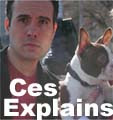So that's the thought. If I were Prof. Zorn, I'd now offer four academics bloviating on this. But I'm more interested in what you think.Neil may be interested in what his readers think, but I couldn't care less.
This is why I don't listen to talk radio. This is why, although I hate Tavis Smiley's show, I don't miss "Talk of the Nation." I just don't care what "Joe six-pack" thinks.
Every day I commute with hundreds of examples of "the man on the street." If I cared what they thought, I would ask them. I don't ask because I don't care.
Regardless of the subject, I want to hear from people who either, 1) know more about the subject than I do, 2) have thought more about the subject than I have, or 3) are just smarter than I am. I guess I just don't see much value in non-expert opinions.
Why does Neil need to solicit his reader's opinions? Is Neil afraid to approach regular folks on the street? Does he lack all social skills? Does he fear that if the people around him knew who he was they would punch and kick him?
II. Also from Steinberg's September 10 column column:
I am announcing the First Annual Maximizing Their Advantage Award, which will be presented in late December to the person best embodying this loathsome trait. I nominate Stollberg as representing the pinnacle of the kind of small-minded, graceless, elbows-up selfishness that so frequently mars life, particularly in the suburbs.I think I will nominate the Chicago Sun-Times columnist who printed a letter from Jeannie Glickson even though she twice asked that he not do so. Consider how well that columnist represents "small-minded, graceless, elbows-up selfishness."
Three times a week, the columnist has the opportunity to express himself and craft his own image in the number two paper in Chicago. I am sure that the columnist hasn't presented every thoughtless and stupid thing he has written in his column. Instead, I believe that the columnist makes very careful and deliberate choices as to what goes into the paper under his name. And if the columnist has regrets about something he has written, he can write a follow-up column to either explain his opinion or to admit that he was wrong.
By contrast, Ms. Glickson not only didn't know that her writing would be published in the paper, she expressly request that it not be published. By printing the letter against her wishes, the columnist was able to present a deliberately unflattering caricature of Ms. Glickson. And of course the letter will likely be the sole public image of Ms. Glickson presented in the Sun-Times.
So the columnist was able to "maximize his advantage" by using Ms. Glickson's letter to construct a grossly unfair straw-man-- a straw-man that he didn't even need to battle because it was so weak that it collapsed under its own weight. And all with no opportunity for Ms. Glickson to reply.
The columnist's cowardly journalistic ambush isn't as bad as the actions of Steinberg's nominee but it was truly "loathsome" nonetheless.
III. Can you imagine being the type of person who considers "Professor" to be an insult? Neil Steinberg clearly does:
If I were Prof. Zorn, I'd now offer four academics bloviating on this. But I'm more interested in what you think.Steinberg clearly thinks that calling Zorn "Professor" is ironic and insulting. But, as any playground bully could tell him, Steinberg has bungled it.
I'd like to pick one or the other stance and leave the equivocating to Prof. Zorn.
If you are going to repeatedly engage in name-calling by using the same ironic name -- let's call it the "negative compliment" -- you need to pick a name that is clearly and demonstrably inappropriate for the subject. For example, you call a fat kid "Slim" or you call a poor reader "Brainiac." Just as calling a weightlifter "Muscles" isn't insulting, neither is calling a writer "Professor." Those aren't negative compliments, they are merely nicknames.
The only time that you can use an ironic insult against a "regular" person is when you are commenting on a particular misstep. For example, when your brother drops the tray of mugs, you can call him "Grace" or when your brother locks himself out of the car for the third time in a year, you can call him "Brainiac."
I suspect that I know the origin of Steinberg's confusion. Someone who was exclusively the recipient of insults as a child would never learned how to properly deliver one. Such a child would only learn that "names hurt." But he would never learn which names are appropriate and when.
That is why Neil Steinberg is now "the 'Brainiac' of insult columnists."













No comments:
Post a Comment